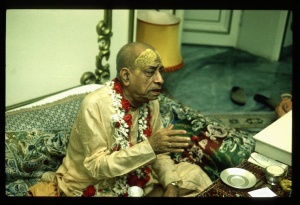SB 7.2.27: Difference between revisions
m (1 revision(s)) |
No edit summary |
||
| Line 1: | Line 1: | ||
{{info | {{info | ||
|speaker= | |speaker=Hiraṇyakaśipu | ||
|listener=Diti wife of Kaspya Muni and sister in law and nephews | |listener=Diti wife of Kaspya Muni and sister in law and nephews | ||
}} | }} | ||
[[Category:Srimad-Bhagavatam - Canto 07 Chapter 02]] | |||
[[Category:Bhagavatam Verses Spoken by Hiranyakasipu - Vanisource|070227]] | |||
<div style="float:left">'''[[Srimad-Bhagavatam]] - [[SB 7|Seventh Canto]] - [[SB 7.2: Hiranyakasipu, King of the Demons|Chapter 2: Hiraṇyakaśipu, King of the Demons]]'''</div> | |||
<div style="float:right">[[File:Go-previous.png|link=SB 7.2.25-26]] '''[[SB 7.2.25-26]] - [[SB 7.2.28]]''' [[File:Go-next.png|link=SB 7.2.28]]</div> | |||
{{RandomImage}} | |||
==== TEXT 27 ==== | ==== TEXT 27 ==== | ||
<div | <div class="verse"> | ||
atrāpy udāharantīmam | :atrāpy udāharantīmam | ||
itihāsaṁ purātanam | :itihāsaṁ purātanam | ||
yamasya preta-bandhūnāṁ | :yamasya preta-bandhūnāṁ | ||
saṁvādaṁ taṁ nibodhata | :saṁvādaṁ taṁ nibodhata | ||
</div> | </div> | ||
| Line 17: | Line 22: | ||
==== SYNONYMS ==== | ==== SYNONYMS ==== | ||
<div | <div class="synonyms"> | ||
''atra''—in this connection; ''api''—indeed; ''udāharanti''—they cite; ''imam''—this; ''itihāsam''—history; ''purātanam''—very old; ''yamasya''—of Yamarāja, the superintendent of death, who gives judgment after death; ''preta-bandhūnām''—of the friends of a dead man; ''saṁvādam''—discussion; ''tam''—that; ''nibodhata''—try to understand. | |||
</div> | </div> | ||
| Line 24: | Line 29: | ||
==== TRANSLATION ==== | ==== TRANSLATION ==== | ||
<div | <div class="translation"> | ||
In this regard, an example is given from an old history. This involves a discourse between Yamarāja and the friends of a dead person. Please hear it attentively. | In this regard, an example is given from an old history. This involves a discourse between Yamarāja and the friends of a dead person. Please hear it attentively. | ||
</div> | </div> | ||
| Line 31: | Line 36: | ||
==== PURPORT ==== | ==== PURPORT ==== | ||
<div | <div class="purport"> | ||
The words itihāsaṁ purātanam mean "an old history." The Purāṇas are not chronologically recorded, but the incidents mentioned in the Purāṇas are actual histories of bygone ages. Śrīmad-Bhāgavatam is the Mahā-Purāṇa, the essence of all the Purāṇas. The Māyāvādī scholars do not accept the Purāṇas, but Śrīla Madhvācārya and all other authorities accept them as the authoritative histories of the world. | The words ''itihāsaṁ purātanam'' mean "an old history." The ''Purāṇas'' are not chronologically recorded, but the incidents mentioned in the ''Purāṇas'' are actual histories of bygone ages. ''Śrīmad-Bhāgavatam'' is the ''Mahā-Purāṇa,'' the essence of all the ''Purāṇas''. The Māyāvādī scholars do not accept the ''Purāṇas'', but Śrīla Madhvācārya and all other authorities accept them as the authoritative histories of the world. | ||
</div> | </div> | ||
__NOTOC__ | |||
<div style="float:right; clear:both;">[[File:Go-previous.png|link=SB 7.2.25-26]] '''[[SB 7.2.25-26]] - [[SB 7.2.28]]''' [[File:Go-next.png|link=SB 7.2.28]]</div> | |||
__NOTOC__ | |||
__NOEDITSECTION__ | |||
Revision as of 18:44, 21 May 2021

A.C. Bhaktivedanta Swami Prabhupada
TEXT 27
- atrāpy udāharantīmam
- itihāsaṁ purātanam
- yamasya preta-bandhūnāṁ
- saṁvādaṁ taṁ nibodhata
SYNONYMS
atra—in this connection; api—indeed; udāharanti—they cite; imam—this; itihāsam—history; purātanam—very old; yamasya—of Yamarāja, the superintendent of death, who gives judgment after death; preta-bandhūnām—of the friends of a dead man; saṁvādam—discussion; tam—that; nibodhata—try to understand.
TRANSLATION
In this regard, an example is given from an old history. This involves a discourse between Yamarāja and the friends of a dead person. Please hear it attentively.
PURPORT
The words itihāsaṁ purātanam mean "an old history." The Purāṇas are not chronologically recorded, but the incidents mentioned in the Purāṇas are actual histories of bygone ages. Śrīmad-Bhāgavatam is the Mahā-Purāṇa, the essence of all the Purāṇas. The Māyāvādī scholars do not accept the Purāṇas, but Śrīla Madhvācārya and all other authorities accept them as the authoritative histories of the world.